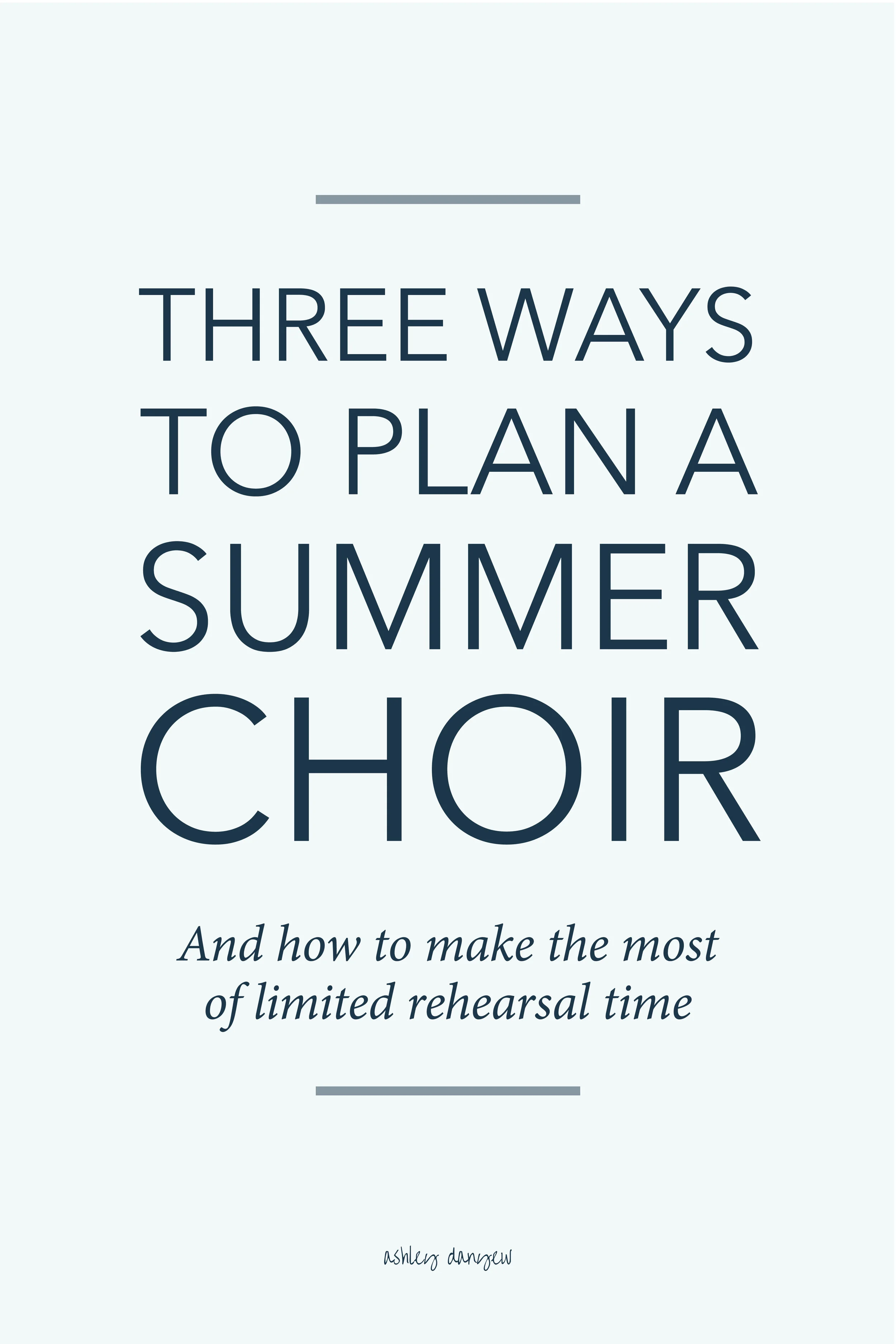It’s that time of the year: The days are longer, the grass is growing taller, and we can (finally) leave the house without putting on a jacket. Summer is here!
As we wrap up our school-year commitments and make plans for those lazy, hazy days of summer, now is the perfect time to start organizing a summer choir.
Now, I know what you’re thinking:
"We all deserve a little break, don’t you think?”
"No one would come if I had rehearsals in the summer.”
It’s true. Summer choirs may work really well in some contexts and not-so-well in others.
The good news is that there’s not a one-size-fits-all model. That means you can create something unique that works for you and your choir members and adds value.
If you’re willing to experiment and try something new this year, there are several key benefits to having some sort of choir over the summer. You can read about some of them in this post: The Case for the Summer Choir.
Today, I’m sharing three unique ways you can organize and structure a summer choir, plus some helpful strategies for making the most of your time together each week.
Three Ways to Have a Summer Choir
No. 1 - Pick-Up Choir
This option is as simple as extending an invitation to your current choir members and congregation to come at a certain time on Sunday morning to learn an anthem and share it in worship.
There’s no commitment required—people can come once, every other week, or every Sunday throughout the summer.
Also, no RSVP is necessary. Simply pick anthems in unison or with simple part-writing that can be adapted to the group you have on a given Sunday.
Here’s a list of 12 easy anthems that are great for summer choirs.
If you have the option, consider rehearsing outside with a keyboard!
Here are two examples of churches that have used this model in the past:
Tenth Presbyterian Church in Philadelphia, PA. Here’s what they say about their June Summer Choir.
Smith Memorial Baptist Church in Williamsburg, VA—read about their summer schedule.
No. 2 - Regular Choir Without Wednesday Rehearsals
If you have a dedicated group of choir members that are interested in singing throughout the summer, consider inviting them to sing on Sundays without mid-week rehearsals. I recommend having 1-2 rehearsals of all the music you plan to sing so you can start the summer choir session with 8-10 anthems already in the folder.
Have everyone gather a little earlier than usual on Sunday mornings, so you have time to rehearse that day’s anthem, plus one or two other things for the coming weeks.
Looking for some fresh inspiration? Here are a few anthems to consider:
No. 3 - Intergenerational Choir
Consider putting together an intergenerational choir for one Sunday or one month this summer (July or August is usually a good time—whichever month more people are in town). Invite your current choir members, people from the congregation, youth, and older elementary-age children to join you.
Choose music that has simple part-writing and is accessible for those not used to singing in a choir (and having to sing something other than the melody!). If you’re doing more than one Sunday, encourage people to sign up in advance and commit to a full month so you know what kind of group you’ll be working with.
Meet on Sunday before worship to learn and work on the anthem together and consider sending out a recording and copy of the music the week before so people can begin preparing the piece on their own.
Looking for some ideas of what to sing? Here’s a list of 25 of my favorite anthems for intergenerational choirs.
A few examples of churches that use or have used this model in the past:
St. Richard’s Catholic Church in Richfield, MN (here’s the announcement they used for their summer choir).
Bryn Mawr Presbyterian Church in Bryn Mawr, PA—read about their summer choir here.
Greenwood Community Church in Warwick, RI (here’s how they structure their summer choir).
How to Make the Most of a Short Rehearsal
Now that we’ve talked about a few different models you might use for your summer choir, let’s talk about how to make the most of your time together. Here are a few helpful tips:
Choose simple, accessible music.
When working with a summer choir, keep in mind that you may have people that don’t really read music or that aren’t used to singing in parts. You may not have as many strong readers and singers as you do in your regular choir and you may not have an equal number of singers on each part.
Also, you’ll have a limited amount of time to introduce and teach the anthem, so make sure it’s something that has a singable melody, simple part-writing, and an easy-to-follow form (not too many repeats or turn-backs). Choose music that is within the realm of your volunteer’s capabilities—something that they can learn quickly and sing with confidence.
Use rehearsal time wisely.
Study the music ahead of time and identify any sections that may be challenging. Is it a difficult rhythm or an unpredictable melodic pattern? Is it the text? Think about a few strategies you can use to teach this concept quickly and effectively. Anticipate things that may be challenging.
Look at how the parts are constructed and have a plan for how to simplify this on Sunday morning if you end up with a smaller group or the parts just aren’t coming together. Decide where you want the choir to breathe and have these places marked in your score in advance.
Start your rehearsal on time and keep everyone focused and on-task. Encourage everyone to arrive a few minutes early so they can get their music and folder and a pencil and be in their seats, ready to sing by whatever time you want to start rehearsal.
Related posts:
7 Tips for a More Productive Choir Rehearsal
10 Secrets for Running a Successful Choir Rehearsal
Making the Most of Your Weekly Choir Rehearsal: 7 Helpful Strategies to Save You Time
Make rehearsal materials available during the week.
It may be helpful to your summer choir to have access to the music and a recording prior to arriving on Sunday morning. This is particularly helpful for families who may be participating, or those who’d like to practice on their own and become familiar with the anthem ahead of time. Plus, this will save you time teaching it from scratch on Sunday morning!
Set out a stack of octavos for people to pick up a week ahead of time and make a simple recording (or point people to one online) that they can use to practice with at home. Alternatively, scan the music and upload it to Dropbox or Google Drive and send out an email to all who plan to sing on Sunday.
Summer choir is a great way to keep your choir members involved in music ministry over the summer while also providing a good opportunity for those who enjoy singing but can’t make a long-term commitment.
Having a choir lead the music in your summer worship is a helpful way to provide leadership for congregational singing and add to the experience of your congregation members. Plus, it can be a fun way to bring people of different ages together to sing—an opportunity they may or may not have otherwise.
I’d love to hear:
Do you have a summer choir at your church? How is it structured or organized?





































